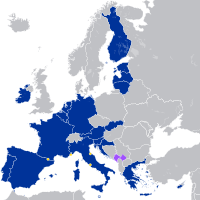Eurozone

The Eurozone is like a big piggy bank where a lot of countries in Europe put their money. But instead of coins and notes, they put in a special kind of money called the Euro.
This piggy bank has some special rules. All the countries that use the Euro have to agree to these rules. For example, they can only spend a certain amount of money each year. If they spend more than they’re allowed, they get in trouble and may have to pay a penalty.
The countries in the Eurozone also have to work together to make important decisions about the piggy bank. They have meetings to talk about the best ways to spend the money and help each other out when they're having a tough time.
But sometimes things can get a little tricky. If one country puts too much money in the piggy bank, it can make the Euro really valuable. This means that the price of things can go up and it becomes harder for people to afford what they need.
On the other hand, if one country takes too much money out of the piggy bank, it can make the Euro less valuable. This means that it becomes easier for people to buy things from other countries, but it can be harder for businesses in that country to compete.
All in all, the Eurozone is a group of countries working together to save their money and make good decisions about how to use it.
This piggy bank has some special rules. All the countries that use the Euro have to agree to these rules. For example, they can only spend a certain amount of money each year. If they spend more than they’re allowed, they get in trouble and may have to pay a penalty.
The countries in the Eurozone also have to work together to make important decisions about the piggy bank. They have meetings to talk about the best ways to spend the money and help each other out when they're having a tough time.
But sometimes things can get a little tricky. If one country puts too much money in the piggy bank, it can make the Euro really valuable. This means that the price of things can go up and it becomes harder for people to afford what they need.
On the other hand, if one country takes too much money out of the piggy bank, it can make the Euro less valuable. This means that it becomes easier for people to buy things from other countries, but it can be harder for businesses in that country to compete.
All in all, the Eurozone is a group of countries working together to save their money and make good decisions about how to use it.
